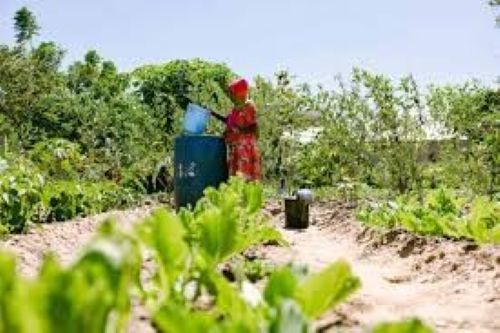LUWEERO, October 19, 2025 — The National Agricultural Research Organisation [NARO] has equipped local cooperatives newly developed seed technologies [tree seedlings] developed to mitigate the impacts of climate change.
The initiative, which promotes agroforestry, targets cooperatives in Uganda’s cattle corridor districts, which are increasingly vulnerable to extreme weather conditions and prolonged drought.
The districts selected to receive the newly developed tree seedlings [including fruit seedlings] are; Isingiro, Mbarara, Kiruhura, Kyankwanzi, Sembabule, Gomba, Kayunga, and Luweero, along with Mubende, Nakaseke, Nakasongola, Kasanda, and areas stretching into the semi-arid Teso Sub-region.
Humphrey Kigabane, an Agroforestry Technician at NARO based at the Mukono Zonal Agricultural Research and Development Institute [MUZARDI], while training cooperative representatives emphasised the importance of establishing tree nurseries, saying they check biodiversity loss, conserve threatened tree species, and combat climate change.
“Agroforestry has emerged as a key approach to climate change mitigation and adaptation, integrating trees, shrubs, and herbaceous perennials into farming systems. It is crucial that organised groups of farmers acquire and share this knowledge within their communities,” Kigabane said, while facilitating a training session at Luwero Field School, Wabusaana, recently.
Initially designed to train individual livestock farmers, MUZARDI’s agroforestry programme was later expanded to cooperatives, particularly in cattle corridor areas, due to the region’s pastoralist tendencies and vulnerability to climate shocks.
Supported by the Food and Agriculture Organisation of the United Nations [FAO], MUZARDI has been instrumental in establishing tree nurseries as sources of high-quality planting materials [seeds, seedlings, and cuttings] in multiple districts.
Under the Integrating Climate Resilience into Agricultural and Pastoral Production Project, NARO has established field schools in Kayunga, Nakaseke, Nakasongola, Luweero, Isingiro, and Sembabule districts.
The National Forestry Resources Research Institute [NaFORRI], the lead training facilitator, reported that at least 22 cooperatives and over 635 individual farmers have been trained in new agroforestry technologies to date.
According to Dr Boaz Odoi, a Senior Research Officer at NaFORRI, the cooperatives have shown growing interest in commercial agroforestry, particularly in fast-growing tree species and establishing viable tree nursery businesses.
“Initially, the focus was on helping farmers build resilience to climate change. But when some cooperatives began exploring commercial agroforestry, we broadened the scope to include them,” said Odoi.
Cooperatives trained include: Kawerimidde Women’s SACCO [Luweero]; Kagoma Tree Traders SACCO [Kayunga]; Mbogo Traders’ Cooperative [Kasanda]; and Petete Agroforestry Farmers’ SACCO [Pallisa], among others.
Odoi trained participants on nursery site selection, soil preparation, nursery bed design, and tree propagation methods such as grafting and budding.
He recommended orienting nursery beds East–West to ensure optimal shade for seedlings during early growth stages.
The hands-on sessions also equipped trainees with skills to use locally available materials such as poles, grass, and banana fibre, to graft fruit tree seedlings, enhancing their agroforestry activities.
Recommended tree species include: Eucalyptus [clones GU8, GU7, GU]; Maesopsis eminii [Musizi]; and Grevillea, Albizia chinensis [Albizia], and Chlorophora excelsa [Migavu].
Among fruit trees, the promoted varieties include mango, avocado, orange, guava, jackfruit, pawpaw, and soursop [Ekitafeeri]. Other high-value species include Cocoa, Musizi, Prunus africana [Entasesa], and Cinnamomum verum [Mudalasin].
FAO continues to support private nursery operators in target districts by supplying shade nets, farm tools, fencing materials, and seedlings, promoting indigenous and fruit tree species for community use.
Fred Kunihira, Chairman of Kikondo Tree Nursery SACCO in Mubende, expressed gratitude for the support received.
“With FAO’s support, we now produce over 20,000 Eucalyptus clones, 50,000 pine clones, 200 Terminalia, 200 Alstonia boonei, and 3,000 Albizia chlorophora seedlings,” he said.
“They provided us with a 3,000-litre tank, watering cans, shade nets, and other tools, which significantly boosted our capacity.”
https://thecooperator.news/agro-input-dealers-in-acholi-receive-training-on-chemical-safety/
Buy your copy of thecooperator magazine from one of our country-wide vending points or an e-copy on emag.thecooperator.news
